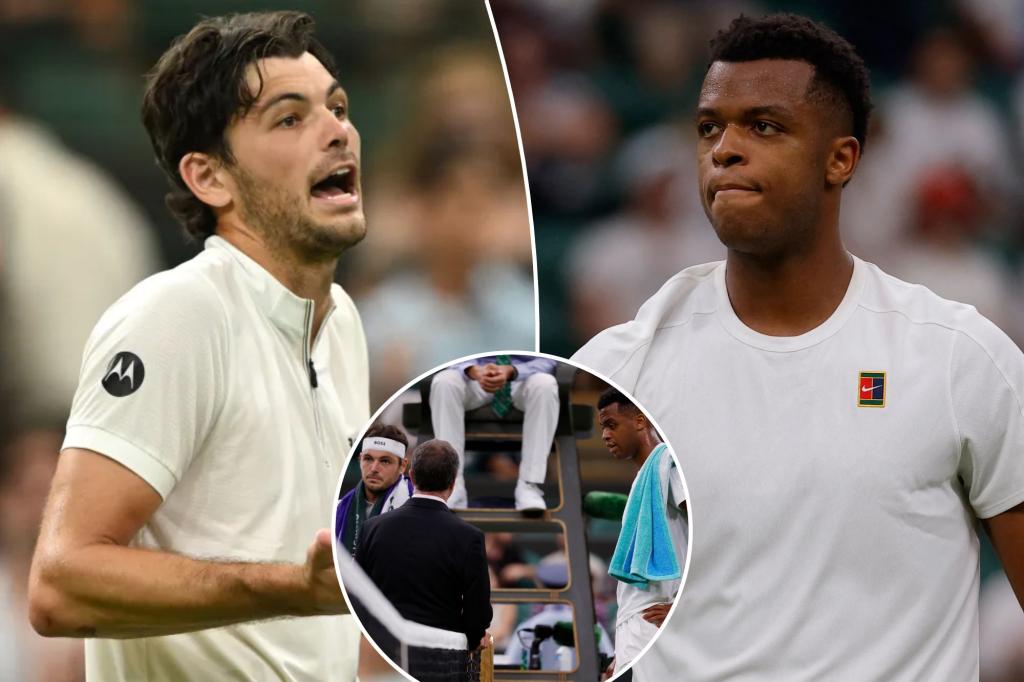
American tennis star Taylor Fritz found himself at the center of a curfew controversy during his first-round match at Wimbledon on Monday night. The match against French player Giovanni Mpetshi Perricard was halted shortly after 10 p.m., despite having approximately 45 minutes left before the All England Club’s strict 11 p.m. curfew. Fritz, the fifth seed, suggested on social media that his opponent was unwilling to continue playing, which led to the suspension.
The incident unfolded when the Instagram account Glue Guy Sports posted a video showing Fritz and Mpetshi Perricard in discussion with tournament officials. The post was captioned, “Let the boys play!!! They got 45 minutes,” to which Fritz responded, “They would’ve let us play if my opponent agreed to, I said I wanted to he didn’t.”
Match Dynamics and Player Reactions
Fritz, 27, initially struggled against the 21-year-old Mpetshi Perricard, losing the first two sets in tiebreaks, 7-6 (8), 7-6 (8). However, he managed to turn the match around by winning the third and fourth sets, 6-4, 7-6 (8), respectively. The curfew interruption came at a critical moment when momentum seemed to be shifting in Fritz’s favor.
Both players were visibly frustrated as the match was paused with the curfew approaching. The American, who has previously reached the Wimbledon quarterfinals in 2022 and 2024, expressed his dissatisfaction with the situation, highlighting the impact of the curfew on the match’s outcome.
Understanding the Wimbledon Curfew
The 11 p.m. curfew at Wimbledon has been in place since 2009, following the installation of a new roof on Centre Court equipped with spotlights. This decision was part of an agreement between local officials, tournament organizers, and residents to ensure that play does not extend beyond the designated hour. According to a 2018 statement from tournament organizers to The Independent, the curfew is a “Planning Condition applied to balance the consideration of the local residents with the scale of an international tennis event that takes place in a residential area.”
“The challenge of transport connectivity and getting visitors home safely is also a key consideration.”
This curfew has been a topic of debate over the years, with players and fans alike questioning its impact on match scheduling and player performance.
Looking Ahead: Fritz’s Next Challenge
Despite the curfew drama, Fritz remains focused on his next match against Canadian Gabriel Diallo in the second round, scheduled for Wednesday. With the tournament set to conclude on July 13, Fritz aims to advance further, hoping to replicate or surpass his previous quarterfinal appearances.
Meanwhile, the defending champion, Spain’s Carlos Alcaraz, continues to be a formidable presence in the tournament. As the competition intensifies, the curfew issue may resurface, especially in tightly contested matches that extend into the evening.
Implications and Future Considerations
The curfew controversy highlights the ongoing tension between maintaining tradition and adapting to the modern demands of international tennis. While the curfew aims to respect local community needs, it also raises questions about fairness and the integrity of match outcomes.
As Wimbledon progresses, players and organizers may need to explore potential adjustments to scheduling or curfew policies to better accommodate the realities of contemporary tennis. For now, Fritz and his fellow competitors must navigate these challenges as they vie for the prestigious Wimbledon title.
The discussion around the curfew and its implications is likely to continue, with stakeholders weighing the benefits of tradition against the evolving landscape of the sport.






